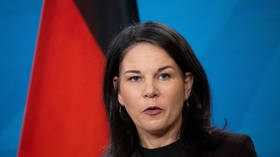Medvedev: Russia’s ready for nukes reduction
Russia is ready for a radical reduction in its strategic nuclear stockpiles, said President Dmitry Medvedev during his meeting with Dutch Prime Minister Jan Peter Balkenende in Amsterdam.
Defining the conditions of arms reduction, the Russian President said that, “First of all, we insist on reaching binding and effectively controllable reductions. Secondly, we are ready to reduce our strategic arsenals, bringing them to below 2002 levels. It is on this basis that our dialogue with our American partners is grounded.”
Furthermore, Medvedev named the price of such a decision.
“We do not agree with American plans to create a global missile defense system. And I want to stress that the reductions we propose are only possible if the U.S. eases Russia's concerns.”
Medvedev said he hoped that he and Barack Obama would agree to considerably cut down nuclear arms.
Their next meeting is expected to take place in about a fortnight in Moscow.
Moscow and Washington are expected to strike a new strategic arms reduction treaty, which is to replace the old Strategic Arms Reduction Treaty One agreement.
The so-called START-1 deal was signed by the United States and Russia back in 1991 and is to expire in December this year.
In 2002, an additional Treaty on Strategic Offensive Reductions was signed in Moscow, bringing further limitations on warheads for both superpowers.
Negotiations on a new START treaty resumed after a long break when, in February 2009, the Obama administration proposed to Russia to slash nukes to 1,000 warheads from each side.
The two sides hope a new treaty would be a U-turn in relations that hit a post-Cold War low under the Bush administration. But only if the document is robust.
“We need to reach a specific, absolutely concrete and binding agreement. In addition, it would be better to include everything in one effective document,” said the Russian President.
Apparently, Russia is ready to agree, but the catch is that the US still wants to discuss this new agreement in connection with US plans to deploy its missile defense systems in Europe, something Russia is severely opposed to.
“We cannot agree with US plans to establish a global missile defense system. I would like to emphasize that the reductions we are suggesting are possible only if the United States meets Russian concerns. In any event, the problem of the relationship between strategic offensive and defensive weapons should be clearly laid out in the treaty,” Dmitry Medvedev has explained.
Russian officials hoped the new Administration in Washington would reconsider the decision. But it seems that Obama is in no hurry to cancel the initial plan.
“I’m skeptical about our future relations with the United States because it insists on Russia disproportionately cutting arms compared to the US,” said Aleksey Fenenko, a researcher at the Institute for Studies of International Security, who shared his concerns with RT.
Now it will all depend on Obama’s visit to Moscow, where he is visit is expected to be crucial on this point.
The Russian side is looking forward to that meeting. After Obama came into office, Moscow hoped for a change in America’s foreign policy and in Russian-American relations, which had become extremely tense during the recent years of the Bush administration.
At a press conference in Holland, Dmitry Medvedev revealed some of the details he is looking forward to discuss with Barack Obama.
“Talks on reducing nuclear stockpiles are not everything we'll have on the table. We have to discuss some world affairs, and of course our bilateral relationship. In recent times, they have significantly worsened. Hopefully, under the new US administration, we'll be able to reshape them in a more favorable manner. Basically, I'm very optimistic about this meeting,” Medvedev said.
The two presidents have already met once, in April, on the sidelines of G-20 summit in London. Though this meeting was short, many experts assessed it as a good sign for the improvement of the relations. That is why the meeting in Moscow is so much anticipated.












